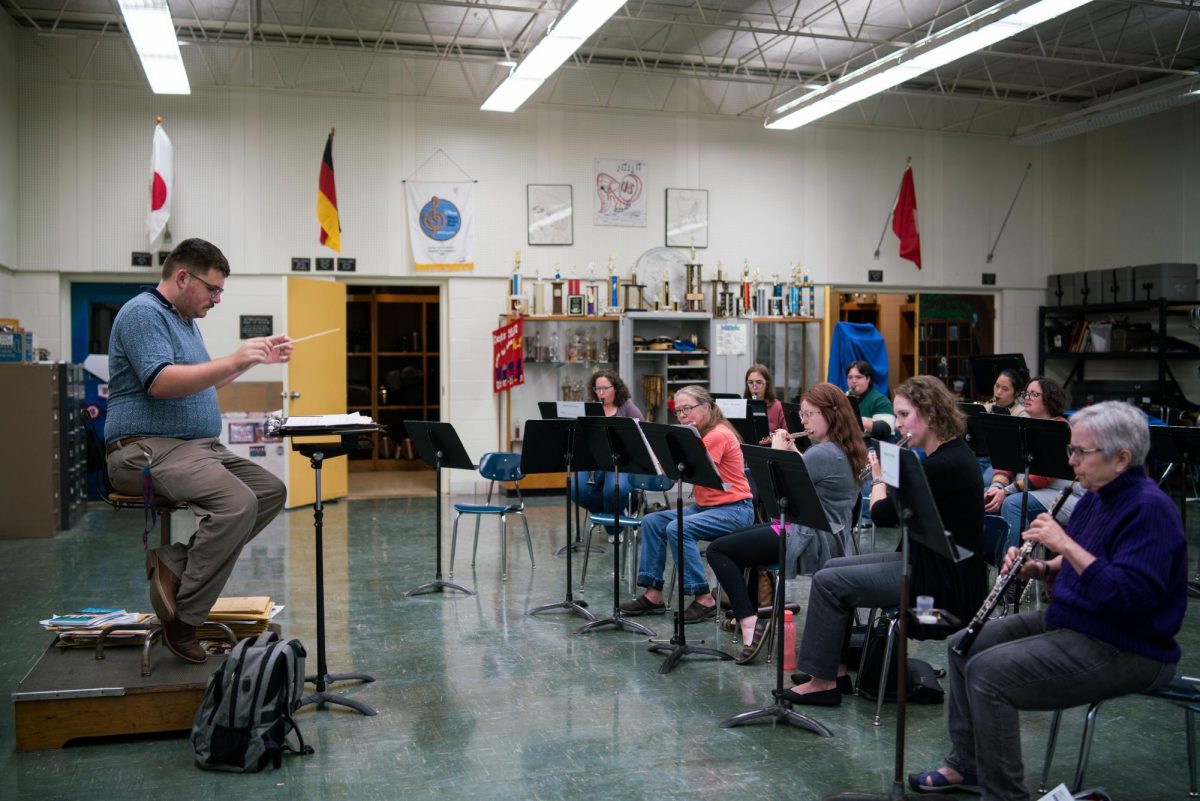The Oberlin Civic Winds, a new concert band in the City of Oberlin, held its first meeting Sept. 6. Director of Bands at Oberlin City Schools Ryan Jaeckin established the group and acts as conductor. Cultivating an enjoyable and relaxed environment was a priority for Jaeckin — entry into the band requires no audition, and individuals of all experience levels are welcome. The Oberlin Civic Winds meet Wednesdays 7 – 9 p.m. in the Oberlin High School band room.
Many musicians begin their journey in a band, finding that the first step to unlocking the magic of music is playing with others. It is a form of connection that transcends words and creates a whole much greater than the sum of its parts. A good band creates beautiful music, not due to feverish practicing and endless rehearsals, but as a product of their personal enjoyment and camaraderie. Jaeckin hopes to cultivate this environment in the Oberlin Civic Winds.
“I think that if we can share our music in an informal way, it can change one’s life,” Jaeckin said. “And that’s what’s important, you know. To connect as humans and create beautiful music is the most important thing to me as a person.”
Jaeckin conducts a multitude of bands at Langston Middle School and Oberlin High School, yet he still found time to begin the Oberlin Civic Winds. This is Jaeckin’s second year as director of bands. He was disappointed to learn that Oberlin College no longer has a band for non-Conservatory students and that the nearest community ensemble meets in Elyria. The College Band dissolved in 2013 when its conductor, Professor Emeritus of Conducting and Ensembles and Music Education John Knight, went into retirement. Regardless of his limited free time, Jaeckin recognized the need for a community band. Community members, colleagues, and College students all expressed interest in revitalizing the spirit of the College Band. The Oberlin Civic Winds band fills a void in Oberlin’s musical opportunities long missed by the greater community.
“I mean, there’s a lot that happens at the College and Conservatory, and in Cleveland,” Jaeckin said. “But there’s nothing in Oberlin like what we do.”
The first Oberlin Civic Winds meeting attracted an eclectic group. Age demographics ranged from teenagers to retirees. Current teachers of Oberlin Schools and high school students alike packed into the band room, toting woodwinds and trombones. Jaeckin highlighted one woman’s excitement at playing music again, as she hadn’t touched her French horn in 20 years. She had played in her high school and college bands but had no reason to pick up her instrument again until now.
“That’s actually the whole reason I did this,” Jaeckin explained. “So that people would dust off their horns and be like, ‘Oh, I can actually do this.’”
College second-year Eli Ramer saw a flier for the Oberlin Civic Winds in Robertson Hall on his way to practice the euphonium. Many students choose Oberlin as a way to continue their musical education while focusing on academics. Ramer’s musical education needs were met through secondary lessons; however, as a euphonium player, his options for an ensemble were limited to the Oberlin Brass Ensemble, which predominantly accepts Conservatory students. Ramer jumped at the chance to play in a community concert band.
“That outlet was something I’ve been looking for for a while,” Ramer said. “I was really happy to see it finally come into existence.”
Ramer had never played in a community band before, but the idea of people with diverse backgrounds joining together to make music intrigued him.
“It’s a lot of people who are very passionate about music, and really excited to be making music together,” Ramer said. “So it’s just fun to be around it in general. Regardless of skill or age, everyone has an appreciation for and a love of all the music that we’re making.”
Jaeckin’s chosen repertoire underlines his hopes for inclusivity. He wants to respect the American tradition of symphonic band repertoire while introducing more diversity. In a concert planned for this fall, the tentative setlist flows around a myriad of genres and cultures. Jaeckin’s goal is for everyone to find a piece they can connect with. The pieces range from concert band repertoire such as Chorale and Shaker Dance by John Zdechlik, jazz standards like “Autumn Leaves,” and contemporary pieces by Charles Carter.
The Oberlin Civic Winds represent Jaeckin’s attempt to bring music back to what is most important. He worries that live music has become prohibitive, an opportunity only afforded to the gifted few who devote a lifetime to polishing their musicianship. His group offers an alternative: a space to communally enjoy music as a participant. He emphasizes joy over commitment and knows that beautiful music will result regardless.
“I’m very fortunate I got such a diverse amount of people that first meeting,” Jaeckin said. “They’re all musicians, but they also do every sort of thing that is not music.”





